Mr. Mega money bags literally as rich as Croesus. Literally including Croesus.
They say money makes the world go round. Thanks to the hard work of science, we now know that this isn't quite the case; it's actually down to the conservation of angular momentum perpetuated by inertia.
There are others who say this expression is idiomatic, which is fair enough. The simple and depressing fact is that ever since the Great Pyramids were merely an unsightly new eyesore on the outskirts of Cairo, wealth has been the deciding factor in influencing the course of our spinny blue globe's history.
Unfortunately for just about all of us, during the majority of that time that wealth has been concentrated in the grubby, greedy hands of a very select cartel. It's estimated that approximately 1% of the world's population control over half of its capital - and with it, they control a whole lot more besides.
But that's nothing: at one point shortly after the first year of our arbitrary Lord, a single man in a single toga was responsible for almost a fifth of the world's whole economic output. He had so much money, he had to own a whole African nation just for somewhere to keep it.
There's the superrich, and then the stupidrich. He and these nine other blokes were all literally rich as Croesus. One of them literally is Croesus.
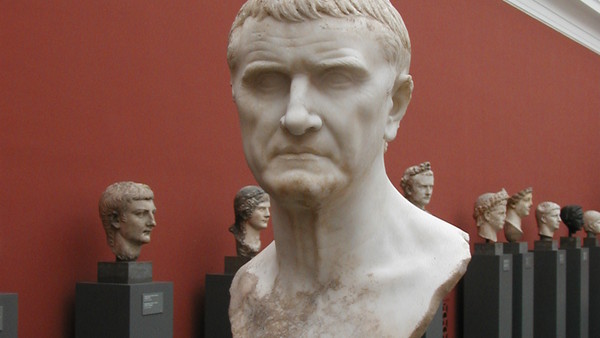
There's no easy way to estimate the wealth of 5th century BC general Marcus Crassus because XE.com'sge of conversion rates doesn't extend to Roman sesterces. Needless to say, the Latinate politician had a spare bob or two lying around.
Crasuss was unique for his time in that his wealth was largely acquired, rather than inherited. Not that he grew up impoverished; he was bequeathed seven million sesterces following the death of his senator father, Licinius Crassus, only to see them stripped away by proscriptions of the Marian-Cinnan faction.
Exiled to Hispania (the modern day Iberian peninsula), thoughts of retribution fuelled Crassus' avarice; when he returned, he set about rebuilding his fortune through proscriptions of his own, seizing the property of patron Sulla's political enemies. As their houses burned, Crassus snapped them up on the cheap. He further filled his caligae by dabbling in the burgeoning slave trade.
With a private fortune equal to the annual budget of the Roman treasury, it's no wonder Crassus's mates knew him as 'Dives' - Latin lingo for 'the rich'. He also played a significant role in thwarting Spartacus' uprising. Not bad for just a head.
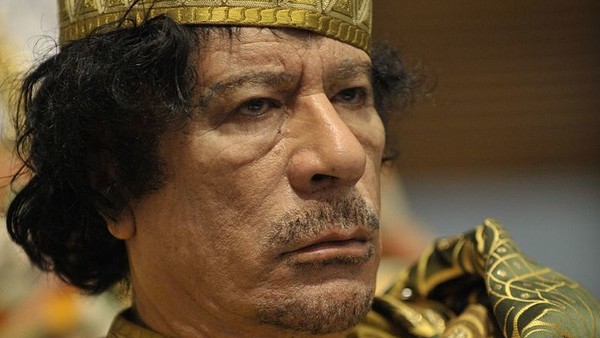
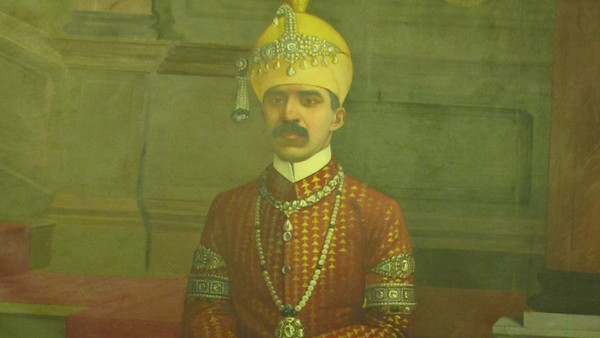
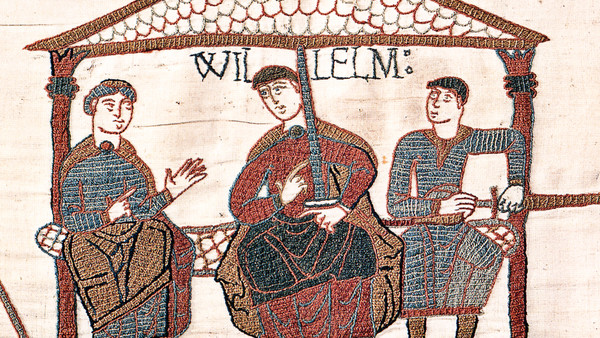
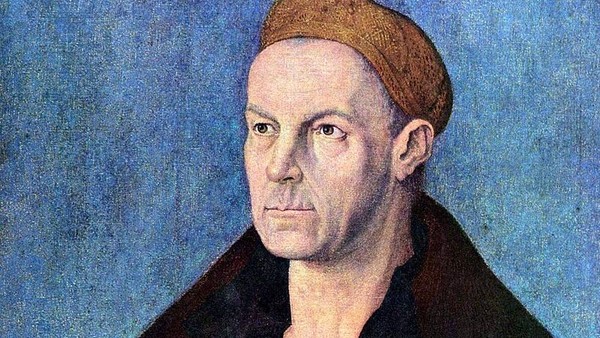
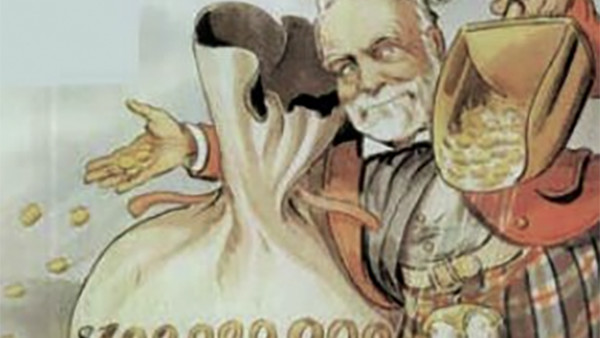


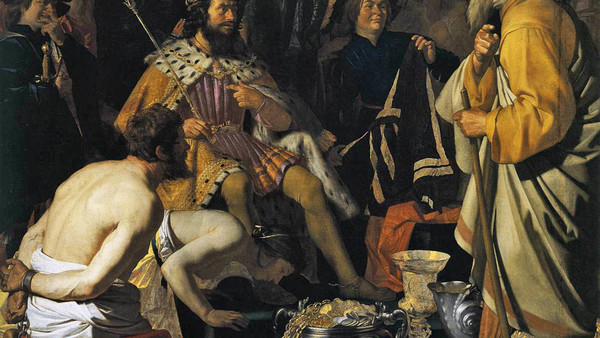
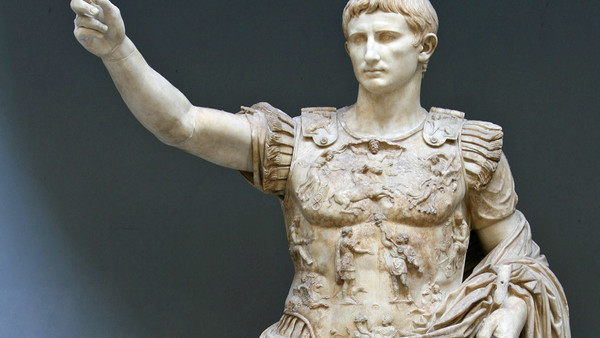
They say money makes the world go round. Thanks to the hard work of science, we now know that this isn't quite the case; it's actually down to the conservation of angular momentum perpetuated by inertia.
There are others who say this expression is idiomatic, which is fair enough. The simple and depressing fact is that ever since the Great Pyramids were merely an unsightly new eyesore on the outskirts of Cairo, wealth has been the deciding factor in influencing the course of our spinny blue globe's history.
Unfortunately for just about all of us, during the majority of that time that wealth has been concentrated in the grubby, greedy hands of a very select cartel. It's estimated that approximately 1% of the world's population control over half of its capital - and with it, they control a whole lot more besides.
But that's nothing: at one point shortly after the first year of our arbitrary Lord, a single man in a single toga was responsible for almost a fifth of the world's whole economic output. He had so much money, he had to own a whole African nation just for somewhere to keep it.
There's the superrich, and then the stupidrich. He and these nine other blokes were all literally rich as Croesus. One of them literally is Croesus.
10. Marcus Licinius Crassus ~ $200 Billion

There's no easy way to estimate the wealth of 5th century BC general Marcus Crassus because XE.com'sge of conversion rates doesn't extend to Roman sesterces. Needless to say, the Latinate politician had a spare bob or two lying around.
Crasuss was unique for his time in that his wealth was largely acquired, rather than inherited. Not that he grew up impoverished; he was bequeathed seven million sesterces following the death of his senator father, Licinius Crassus, only to see them stripped away by proscriptions of the Marian-Cinnan faction.
Exiled to Hispania (the modern day Iberian peninsula), thoughts of retribution fuelled Crassus' avarice; when he returned, he set about rebuilding his fortune through proscriptions of his own, seizing the property of patron Sulla's political enemies. As their houses burned, Crassus snapped them up on the cheap. He further filled his caligae by dabbling in the burgeoning slave trade.
With a private fortune equal to the annual budget of the Roman treasury, it's no wonder Crassus's mates knew him as 'Dives' - Latin lingo for 'the rich'. He also played a significant role in thwarting Spartacus' uprising. Not bad for just a head.
9. Muammar Gaddafi ~ $200 Billion

Apparently, being able to line your own and your family's pockets with billions of dollars is just one of the happy side-effects of spearheading a socialist revolution leading to the formation of what was - according to Gaddafi - the 'only democratic state on the planet'. The words 'kleptocracy', 'cronyism', and 'dictatorship' didn't appear in the former Libyan leader's Green Book.
As the unopposed leader of the north African state for the better part of four decades, Colonel Gaddafi had complete sovereignty over the continent's largest oil reserve, which was immediately nationalised after he seized power. The petro-boom of the '70s quickly made Libya one of Africa's richest nations - and Gaddafi was more than comfortable setting some of the profits aside for his own purse.
Whilst the colonel did redistribute some of the nation's vast wealth to other African leaders, it was less in the spirit of generosity and more in the interest of propping up the regimes of similarly autocratic allies. Other 'state investments' included properties in London's West End, as well as shares in major publishing group Pearson. Far less of Gaddafi's fortune was plunged into improving state infrastructure, leaving a third of the population living below the poverty line by the end of his rule.
At the time of his death, the Gaddafi family was estimated to have a wealth in excess of $200 billion, a kitty used in part to fund a lavish lifestyle which ultimately proved a motivating factor in their deposition. Were it not for the distinction between the dictator's personal wealth and that of the state being ambiguous, Gaddafi could theoretically have been considered the richest man in the world upon his brutal demise in 2011.
8. Osman Ali Khan ~ $210 - 300 Billion

Osman Ali Khan - or, to give him his full title, 'His Exalted Highness Nawab Sir Mir Osman Ali Khan Siddiqi, Bayafandi Asaf Jah... the VIIth - was the final incumbent in the post of Nizam of Hyderabad before it was absorbed by India following the latter's independence. Hyderabad, boasting a rather rare and frankly beautiful maroon flag, existed as a 'princely state' under the British Raj, and appropriately enough, its ruling Nizam lived like one.
Whilst the role of Nizam was still in effect, Osman was reputed to be the wealthiest chap on the planet, even appearing on the cover of Time magazine bearing the sobriquet. Adjusted for inflation, the Nizam's wealth was estimated to be somewhere between $210 - 300 billion. No wonder then, that he was able to use the Jacob Diamond - the fifth largest in the world - as a paperweight. Well, what else is it for?
Perhaps the key to Osman's mammoth fortune lay in him being a tightfisted miser. Despite possessing an estimated £100m in gold and silver, the parsimonious prince restricted himself to a daily budget of just £1 per day. He even stooped to scrounging for cigarettes from his staff - despite having money to literally burn.
The de facto King of Hyderabad also operated his own mint. It's pretty easy to become a multi-billionaire when you can print your own money.
7. William The Conqueror ~ $209 - 230 Billion

The arrow which felled King Harold at the Battle of Hastings wasn't the only eye-watering aspect of William the Conqueror's life - so too are the figures pertaining to his staggering wealth.
William's fortune didn't just derive from his eponymous proficiency at an autumnal nut-breaking sport (that's conkers for non-Brits), but was rather plundered from the multiple campaigns as he cut a swathe through England in 1066. Upon assuming the crown, the new king took entire control of the treasury - and every single scrap of land in the country - before redistributing the prize plots to his most loyal retainers, creating the stratified system of the landowning elite which persists to this day.
Despite his royal generosity, big Willy still retained a fortune of at least a cool $209 billion - the approximate figure inherited by his sons Odo and Robert upon his death in 1087.
6. Jakob Fugger ~ $280 - 300 Billion

Jakob Fugger and family amassed such considerable wealth through the Italian textile trade that he earned the sobriquet 'Fugger the Rich'. Historical accounts tell of shouts throughout the streets of medieval Augsburg echoing, "there's that rich Fugger!" Presumably his mum was similarly known as "Rich Mother Fugger"?
Greg Steinmetz's book about the German industrialist inflated Fugger's wealth somewhat, proclaiming him on its cover as 'The Richest Man Who Ever Lived', but he wasn't far off. Fugger began life with not a silver, but a solid gold spoon in his mouth, inheriting vast sums from his grandfather Hans, one of Augsburg's richest burghers. Leading the family business, Fugger's company grew exponentially when it began mining copper and silver in Bohemia, and soon held a monopoly on the copper trade across Europe.
Though Fugger's supposed $280 billion is difficult to ascertain, it is corroborated by his considerable, almost crucial influence on 15th century politics. In exchange for state concessions which would allow his pockets to grow wider, Fugger funded various arms of statecraft, helping prop up Emperor Maximilian I and the Spanish King Charles V. Fugging hell.
5. Andrew Carnegie ~ $310 Billion

Unlike most of the moneybags in the mausoleum of mega-millionaires, Andrew Carnegie didn't wisely invest all his cash on property, playthings, or political favour, but instead chose to splurge over 90% of it on philanthropic causes like a right mawky sap.
America's second wealthiest industrialist grew up in humble origins. Born in the small Scottish town of Dunfermline, Carnegie's family shared a single room cottage with neighbours. The young Andrew owed his future fortune to charity; he received his education courtesy of a free school gifted by Adam Rolland. The gesture stuck with him.
With the family not having a spare dime to scratch their collective arses with, they took the plunge on the potential prosperity of America, migrating over 5000 miles to Pittsburgh. The move changed Carnegie's life. His work ethic saw him rapidly move from being a humble telegraph messenger to the personal telegraph assistant of the railroad company's Andrew Scott. When Scott, impressed by Carnegie's savvy, loaned him $500 to invest in Adams Express, his mother remortgaged the house as collateral. It paid off - to the tune of $10. Nevertheless, the delighted Carnegie was hooked.
Over the next 50 years, Carnegie continued to invest, leading the rapid expansion of the United States' steel industry. In 1901, he sold the Carnegie Steel Corporation to J.P. Morgan, netting somewhere in the region of $310 billion. Sick of the bags of cash cluttering up his house, Carnegie spent the remainder of his life redistributing his wealth to charitable causes, setting up dozens of educational institutes which today bear his name.
4. John D. Rockefeller ~ $336 Billion

America's two wealthiest men couldn't have had more different motivations. Whilst Andrew Carnegie learned the value of hard graft as a consequence of his parsimonious upbringing, John D. Rockefeller's pursuit of fortune began with the questionable morals of his con-artist father, who vowed "to cheat my boys every chance I get" in an effort to make them business savvy.
As a teenage bookkeeper growing up in Ohio, the thought of charity never entered the youngster's mind. He had precisely two overblown ambitions: to live to 100, and to earn $100,000.
Rockefeller hit the first milestone and then some, with his Standard Oil Company founded in 1870 expanding to control over 90% of the US oil business, giving him an accumulated wealth of approximately $336 billion.
Carnegie wryly quipped that "the man who dies rich dies disgraced." His rival on the rich list had other ideas, with the bulk of his titanic estate passing into his family's hands upon his death in 1937. He missed out on his second goal by three years though, popping his clogs at 97. What a loser.
3. Musa I Of Mali ~ $400 Billion

Such was the frankly ridiculous extent of Mansa Musa's colossal wealth that it's difficult to put a precise figure on it. As the ruler of the Malian Empire, Musa had access to over half of the world's gold supplies - by some happy coincidence, at a time during the 14th century when the precious metal was enjoying its highest demand. He was so rich that nobody could quite comprehend it; his golden estate looked like it'd been ran ramshackle by a drunk Midas.
Devout Muslim Musa's pilgrimage to Mecca in 1324 proliferated scarcely believable tales of his infinite pockets. Witnesses reported a procession comprising 60,000 men elaborately dressed in Persian brocade and silk, including 12,000 slaves bearing 4lbs of gold each. They steered a mammoth menagerie, including 80 camels each bearing up to 300lbs of gold dust. The aureate-laden cortège wasn't simply for show; Musa handed out lumps of gold to the impoverished on his journey, stopping every Friday to build a mosque.
The King of Timbuktu's generosity was so lavish that his pilgrimage crippled the Mediterranean economy for the next decade. The abrupt, absurd influx of affluence into the Mesopotamian cities of Medina, Cairo and Mecca drastically lowered the value of gold - a situation only rectified when Musa himself borrowed as much of it as possible on his way back home.
2. Croesus ~ Unknown (But Bloody Loads)

The total zeroes on the end of Lydian king Croesus' bank account were so numerous that he gradually transformed into myth, a man said to be "outside the conventional restraints of chronology."
Croesus didn't just have money; he invented money, issuing Lydia with its first true gold and silver coins, making it the first civilisation in the world to use them as currency in the process. The city was literally flowing with gold; the River Pactolus was said to bear the precious metal which provided the leader with his great reserves. In reality, the waters contained deposits of electrum - an alloy of gold and silver which the Greeks referred to as 'white gold'.
According to the legend of Herodotus, Croesus invited the sage Solon to luxuriate in the light of his infinite riches. Presuming he had it all made, the Lydian king smugly asked his guest who the happiest man on the planet was - thoroughly expecting his name to echo back. He was gravely disappointed, as Solon went on to forewarn that the fickleness of fortune meant true happiness couldn't be gauged until life was over.
True enough, Croesus' mountains of money offered little sympathy when his son was accidentally killed and his wife committed suicide. Today, he is sometimes held as a parable for the pitfalls of greed - but his name is more commonly synonymous with supreme affluence.
1. Augustus Caesar ~ $4.6 Trillion

There are many things the disgustingly superrich can splurge their stupefying fortunes on. How about a mid-ranking Premier League football team, whose subsequent and inevitable success lionises its new chairman, entirely deflecting attention away from the provenance of their problematic providence? Perhaps a flotilla of yachts to rival the naval strength of several small nations? Or maybe a chain of tropical islands snatched from those very same small nations?
All these things would have been trifles for Augustus Caesar. At one point, he ownedEgypt.
As ruler of the Roman Emperor around the turn of the first millennium AD, Caesar presided over a principate which gave rise to approximately 30% of the entire world's economic output. As brilliant a statesmen as he was, he wasn't above a little idle kleptocracy, creaming off over one-fifth of the empire's wealth to stuff down his toga. In modern terms, that amounted to just under $5 trillion - about a quarter of the United States' gross domestic product today. Wowsers.

Blogger Comment
Facebook Comment